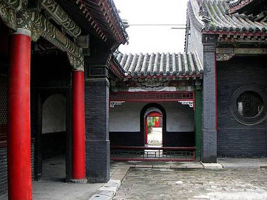Fengshui
Feng means wind and Shui means water. Fengshui is a Chinese traditional discipline which studies the way in which human beings co-exist in harmony with nature. In ancient times, our Chinese ancestors were aware of the existence of Qi in nature, the natural rules discerned by them during their long labors. To be specific, Qi is seen as a mystical drive greatly influencing people's daily life. At first, they used the rules of Qi simply to choose the locations of their houses and graves. By following these rules, they believed well-being would knock at the door, otherwise bad luck would befall.

There are three principles of Fengshui: The unity of human beings with nature, the balance of Yin and Yang, and the attraction and repulsion of five elements - metal, wood, water, fire and earth. These principles are set up to help people pursue good fortune and avoid disaster, thus improving their living standard.
Fengshui gives people many suggestions on how and where to build houses. For example, houses should have their backs to the north and fronts to the south. Because when they face south, houses can easily absorb sunshine and avoid cold north winds in winter. This is a benefit to people's health. So this tradition has come down to the present, especially in rural areas. Also, the size of a house must be moderate, neither too big nor too small. A small house with too many people living in it is not recommended; neither is a large house with a few people. This is in accord with the doctrine of the Mean.

Fengshui has strict requirements on the proper positioning of the central axis in building cities. Generally speaking, the central axis should run from north to south, with its north end pointing directly to a mountain running from east to west. The mountain is regarded as the guardian of the city. A winding river around the city is believed to be an auspicious feature. The Forbidden City was built strictly abiding by these rules.
Nowadays, Fengshui still plays an important role in people's lives. To improve their quality of life, many people decorate their houses according to Fengshui rules. For example, beds shouldn't be put too close to windows because beams of light would directly affect the quality of sleep. Mirrors should not be hung on walls opposite beds in case you may be scared by reflections at night. And beds should not be put directly opposite doors, otherwise you may feel unsafe.

Nowadays, Fengshui still plays an important role in people's lives. To improve their quality of life, many people decorate their houses according to Fengshui rules. For example, beds shouldn't be put too close to windows because beams of light would directly affect the quality of sleep. Mirrors should not be hung on walls opposite beds in case you may be scared by reflections at night. And beds should not be put directly opposite doors, otherwise you may feel unsafe.
Site Search
News
Random Articals
Weather
Join Our Newsletter
Send This Page to Friend
To Email this page to a friend
1. Use Your Default Email Client
2. Use Our Recommend Page
Online Contact
nouahsark
1438084734
+ 86 158 00 323 707
+ 86 158 00 323 707
nouahsark@hotmail.com

If you like this article please feel free to share it to your favorite site listed below: